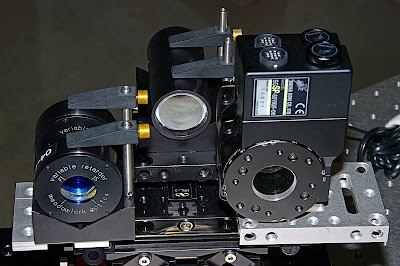I just got a 'draft' of my bio from our publications lady. I'm not exactly sure what the intent was, but it's about the most ignorant and insulting bio I've had a co-worker put together. As a team player, you're supposed to highlight the positive and talk about what a person does. Perhaps you'd mention accomplishments or other activities I've done. It's up to interpretation, but it can be read in a very ridiculous manner:
David Harrington received his PhD from UH in 2008, and instead of moving on to a new venue, he has stayed as a postdoctoral fellow to continue his work on spectropolarimetry of young disk stars with Jeff Kuhn. Spectropolarimetry enables scientists to measure the polarization of light from stars and other celestial objects more precisely than is possible with a regular polarimeter. Spectropolarimetry is used to measure stars' magnetic fields and to investigate the origin of spectral lines.
To academics and anybody who knows english it implies:
David Harrington got his PhD here but couldn't find another job because he's lazy and stayed on with a sympathetic old boss doing the same old thing because he couldn't think of anything creative to do. Spectropolarimetry is a bit better than polarimetry because the name is longer, though we're not going to say anything more than that and apparently he does something with it, though we're not going to say what he does. It can be used to measure magnetic fields an other things, but we're not going to mention what he actually did with it, nor that he built it. We're not going to mention anything else that anybody at the IfA would know about like publications, other fields he works in, or anything that is on the website that I (the publications lady) know about. We're not going to say he graduated a year early or mention that he's been invited to work all over the world or say anything about all the functions we know he's done. We'll just end without a punchline, just like him.
Any person with a brain would know that you don't introduce a person like that. You could write something a lot stonger and much more positive for the public to read:
David Harrington received his PhD a year early from UH in 2008 but stayed on as a postdoctoral fellow to make use of the excellent observatories this state offers. In addition to continuing to develop linear spectropolarimetry as a tool for imaging circumstellar environments, he has joined programs in adaptive optics, stellar magnetic fields and solar coronal imaging. Being interested in unique instrumentation and new capabilities for the worlds best observatories, he is working with many IfA Manoa and Maui faculty on several projects. There are only two high-resolution spectropolarimeters on large telescopes in the world, both in Hawaii, one built for his PhD. In addition to upgrading one for use in measuring stellar magnetic fields, he is helping to adapt the worlds largest curvature adaptive optics system for use with this high resolution spectropolarimeter, participating in solar eclipse coronal observations and improving the SolarC coronagraphic imaging spectropolarimeter. These instruments will enable new investigations of the near-star environment, stellar magnetism, solar corona and are useful for many other applications. In addition to instrumentation, he is an instructor for the Center for Adaptive Optics summer school in Santa Cruz, an Akamai Maui Short Course lead instructor and hosts visiting grad students and summer interns in instrumentation as well as solar and stellar observation.
Or you could just keep it simple:
David Harrington received his PhD from UH in 2008 but stayed on as a postdoctoral fellow to make use of Hawaii's world class observatories. In addition to continuing to develop linear spectropolarimetry as a tool for imaging circumstellar environments, he has joined programs in adaptive optics, stellar magnetic fields and solar coronal imaging. His projects include an upgrade to a spectropolarimeter for use in measuring stellar magnetic fields, helping to adapt the worlds largest curvature adaptive optics system for use with this high resolution spectropolarimeter and working with solar coronal instrumentation. These instruments will enable new investigations of the near-star environment, stellar magnetism, solar corona and are useful for many other applications. He is an instructor for the Center for Adaptive Optics summer school, an Akamai Maui Short Course lead instructor and works with visiting grad students and summer interns in the summer.
God damn. Or even just re-word it to be less insulting.
David Harrington received his PhD from UH in 2008, and stayed as a postdoctoral fellow. He will continue to work with spectropolarimetry of young disk stars with Jeff Kuhn. He also will be using this technique to measure stars' magnetic fields.
I didn't expect a PR department to warn a potential victim of sabbotage, or maybe they just assume I'm an academic and don't know english... Shouldn't she just have published it and then Molotov-coctailed my office?
(Sean - that was for you).

 It's nowhere near done, but here's the layout....
It's nowhere near done, but here's the layout....










































